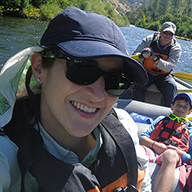El Niño and California Rafting
Posted December 28, 2023 by Lenka Bostian
When meteorologists and newscasters start mentioning El Niño, California rafters perk up and take notice. That’s because this climate pattern that occurs thousands of miles away in the Pacific Ocean can have significant impacts on California snowpack and rain totals, and thus the whitewater rafting season in the coming year.
First things first – What actually is El Niño?
El Niño is a phase in the El Niño-Southern Oscillation (ENSO) which is a climate phenomenon characterized by periodic fluctuations in sea surface temperatures and atmospheric conditions in the equatorial Pacific region. Normally, the trade winds blow from east to west, pushing warm surface waters toward the western Pacific, and resulting in cooler waters along the coast of South America. During an El Niño event, there is a reversal of these typical conditions. Trade winds weaken or outright reverse and allow the accumulated warm water in the western Pacific to migrate eastward. This switcharoo influences weather and climate around the world in various ways. Specifically, what are the effects on the conditions in California?
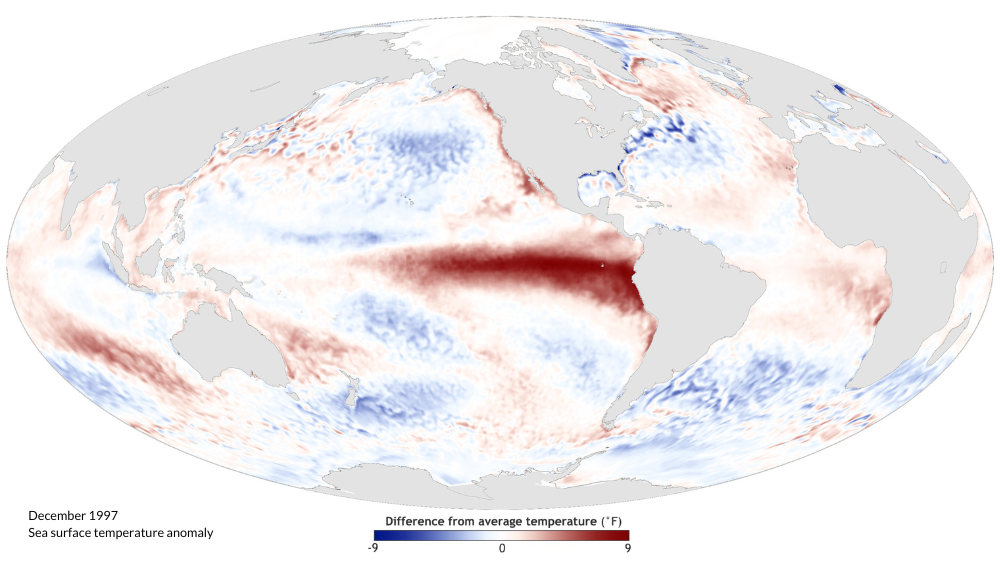
How does El Niño affect California weather?
Since most El Niños typically peak between November and January, their strongest influence on California weather is in the winter months. The Pacific jet stream and storm tracks tend to shift southward, often bringing higher-than-average amounts of snow and rain into the Golden State – especially the central and southern portions. Warmer ocean temperatures can also help develop atmospheric rivers – those narrow bands of moisture that can drop considerable amounts of precipitation into the region. Just a handful of such atmospheric rivers can shape the overall outcome of the entire wet season (October-April), depending on their strength and their aim. Most of California’s rafting rivers originate in the Central Sierra Nevada, so storms hitting this region tend to have the biggest impact.
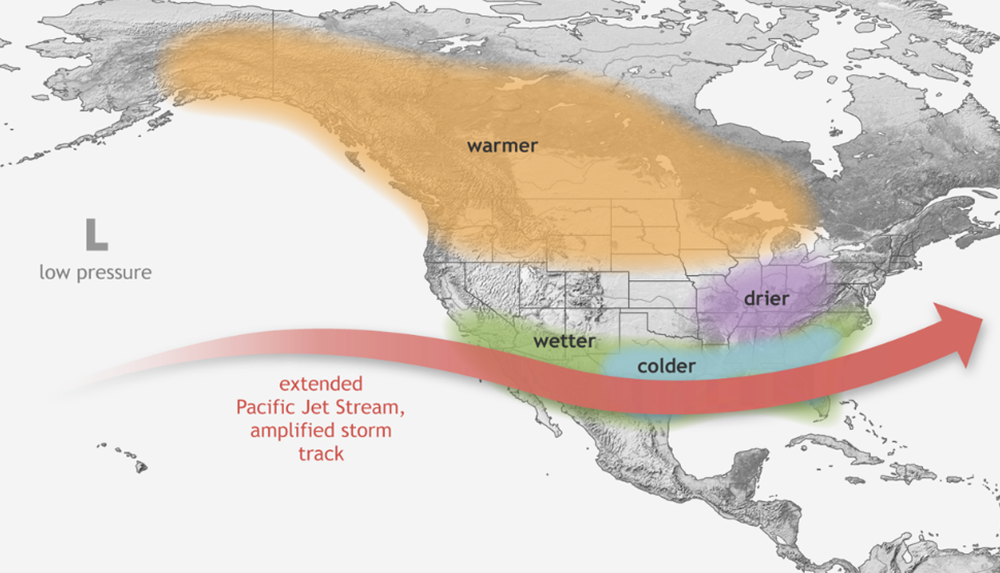
Does El Niño guarantee more water for rafting?
Now, if only the equation of ‘El Niño winter = big snowpack = exceptional California rafting season ahead’ was unfailingly accurate! The fact is, weather is complicated and a strong El Niño doesn’t always result in above-average snowpack and big whitewater ahead. Sometimes the storms get funneled further south or further north along the West Coast, bypassing the watersheds that feed California whitewater rivers. Other times, a mix of oceanic and atmospheric variables diffuse the effects of El Niño altogether. Additionally, scientists are only beginning to understand how climate change influences these events as the Earth keeps getting warmer.
Past El Niño years compared to California rafting seasons
Over our 60+ years of rafting on California rivers, we’ve seen extra wet years, extra dry years, and everything in between. Not all of the big snowpack years were El Niño years and not all El Niño years experienced a large snowpack. We have learned first-hand that while El Niño brings an increased potential for above-average precipitation, this does not always pan out. In fact, one of the recent very strong El Niño winters of 2015-16 left us with below-average snowpack statewide. On the other hand, the most recent big water year of 2023 did not have an El Niño connection at all.
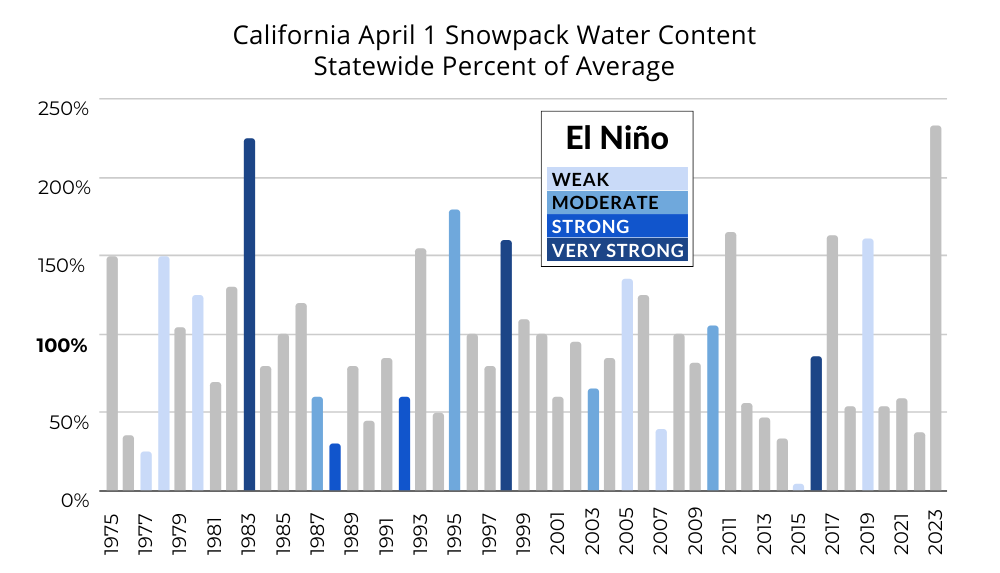
El Niño or not – A great California rafting season ahead
California whitewater rafting is dependent on climate and weather. We need winter storms coming from the Pacific Ocean to hit the mountain walls of the Sierra Nevada, drop precipitation, and feed our beautiful rivers. Above-average rainfall and snowpack – whether a result of El Niño or not – are often seen as the ultimate rafter’s dream but a snowpack bonanza is not necessarily required for an amazing whitewater rafting season. That is because many of the 10 California rivers we raft on have high-elevation reservoirs that can release water stored from previous winters on a set schedule. Dam-controlled rivers, such as the South and Middle Fork American, Tuolumne, and Cherry Creek / Upper Tuolumne allow us to have a full rafting season with a wide range of trip options (Class 1 through Class 5) even in years of below-average snowpack.
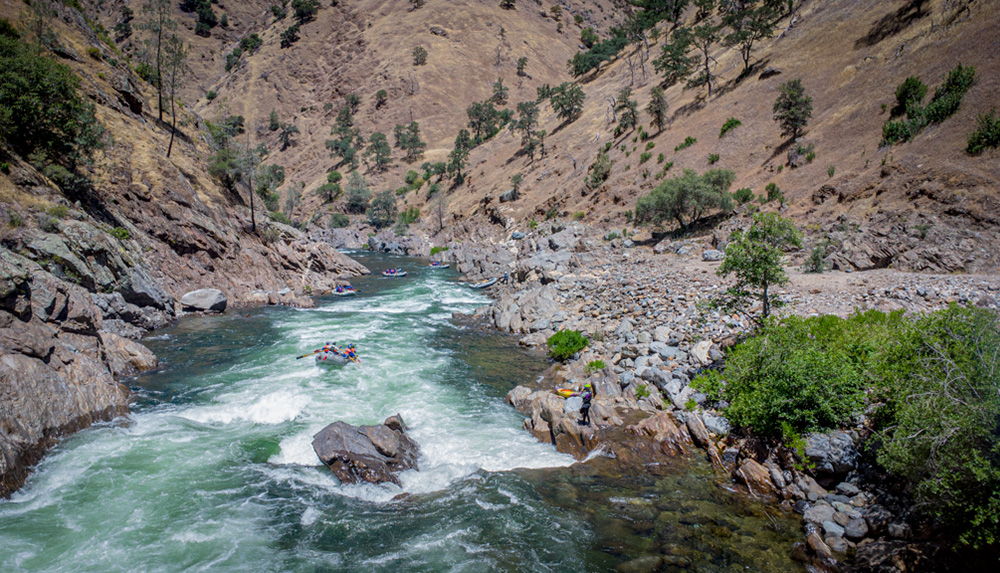
While it is exciting to hear reports of an El Niño winter and what it may mean for the upcoming rafting season, in the end, it is only one of the factors that affect us. As we’ve done every year since 1962, we embrace whatever winter weather comes our way and turn it into an exciting and memorable rafting season. (Learn more about how we predict California river flows for rafting). So, get ready for laughs, thrilling rapids, and the joy of exploring the breathtaking California rivers with the All-Outdoors family!
